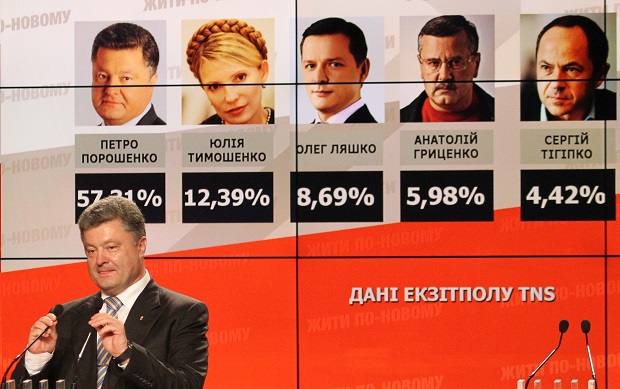
If Moscow Keeps Backing Rebels in Southeast Ukraine, Kyiv Must Rely on its Army
Ukraine took a major step toward normalcyand political stability with an orderly and largely peaceful vote in the May 25 presidential election. Turnout was at least adequate, despite the strenuous efforts by Russian-led insurgents in the East to disrupt the vote. According to the Ukrainian election watchdog OPORA, voter participation as of 4 p.m. Ukrainian time was 45 percent. The final turnout will certainly top 50 percent. The separatists were successful, however, at blocking many citizens in the Donetsk and Luhansk oblasts from voting, shutting down nearly 75 percent of the polling booths in those two provinces and forcing civilian monitors from the Organization for Security and Cooperation in Europe (OSCE) to abandon efforts to observe the election in that region, known as Donbas.
|
Business magnate and former economy and foreign minister Petro Poroshenko won 55 percent of the vote according to exit polls, prompting the second-place candidate, the ambitious former prime minister Yuliya Tymoshenko, to concede the election. This is more good news for the country because, had Mr. Poroshenko fallen short of 50 percent, a runoff election would have been held in three weeks, giving the insurgents another target for disruption.
The OSCE observation mission will announce its assessment of the vote Monday afternoon in Kyiv. If they deem it legitimate, which is likely, the big question will be how Moscow reacts.
Russian President Vladimir Putin has positioned himself for maximum flexibility. On the one hand, after weeks of questioning the legitimacy of this vote, he suggested May 23 that he would accept the verdict of the Ukrainian people. At the same time, his operatives have continued their campaign to sow disorder in the East. (The “prime minister” of the secessionist “Donetsk People’s Republic” is Moscow political operative Alexander Borodai; the commander of that movement’s armed militias is Russian army Colonel Igor Girkin.) So Mr. Putin can accept the elections as legitimate and work with Mr. Poroshenko, or he can point to the low voter turnout in the East and say the vote is not representative.
Moscow may be tempted to declare the vote illegitimate. But this option involves some risk because President Barack Obama and Germany’s Chancellor Angela Merkel announced weeks ago that if the Kremlin disrupts the elections, it will face sanctions against whole sectors of its economy. What’s more, Ms. Merkel has urged Mr. Putin to accept the verdict of the OSCE. It is more likely that the Russian president will not challenge the legitimacy of the election, but will continue to covertly support and supply the insurgency in the East.
In that case, the first major challenge for Mr. Poroshenko will not be reaching out to the Kremlin, but mobilizing his security apparatus to carry out an effective counter-insurgency operation in the Donbas region. The interim government in Kyiv has been suggesting that it will do just that after the elections. Some credible Ukrainian observers claim that the country’s military has the ability to do that. If it does not, the Sunday vote could be a false dawn.
John Herbst is the director of the Dinu Patriciu Eurasia Center at the Atlantic Council. From 2003 to 2006 he served as the US ambassador to Ukraine.
Image: Former economy and foreign minister Petro Poroshenko speaks to supporters in front of a display of exit poll results for himself and other candidates in Ukraine’s presidential election, May 25. Poroshenko claimed victory after exit polls gave him an absolute majority in the vote. REUTERS/Stringer
